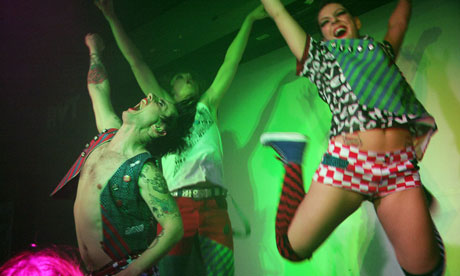
Performed with gusto … Readers Wifes Fan Club. Photograph: Dr J
How can we get an audience for experimental theatre? One night last week during the run of our new show, Readers Wifes Fan Club, in Vauxhall, there were 30 people in the audience – most of them friends with comps. What's gone wrong?
Duckie don't normally produce fringe-theatre runs. With our roots in gay clubland, we have been specialising in "event culture" – innovative one- or two-night-only celebratory theatrical club events. Usually our shows are high-concept hedonistic extravaganzas on important calendar days, when people are looking for somewhere to celebrate: Valentine's day, Gay Pride day, Bonfire night or as a Christmas party outing. Tickets usually sell out before the night: last year, our Gay Shame drew 3,500 to the Brixton Academy. Drawn from the queer clubbing community, these "traditionally non-theatregoing audiences" have served us well in terms of bums on seats and brownie points from the Arts Council.
The new show, by contrast, is experimental theatre for experimental theatre's sake, not a clubby knees-up, or event culture with a social reason to attend. It is less easy to describe in a soundbite: the concept involves DJs, multiple video screens, acting out to a collage of plagiarised retro pop-culture clips, fandom and stardom, and working-class kids escaping from their lives through pop music. The show itself is, I think, good – original, passionate, fun and performed with gusto by a superb young cast. So where are all the punters?
It is a real challenge to market new experimental theatre, especially as Duckie's core audience are not really "experimental theatregoers". It is very difficult to sell something if you don't yourself know what it exactly is until opening night. As producer, perhaps I should have nailed the holding form as a one-liner before the artists devised the piece in the rehearsal room. But if everything is decided before the devising process and before it meets an audience, how can true experimentation happen? Many small-scale performing arts companies have such a short run that they never have to face the reality of getting a genuine audience. A two- or three-night run is de rigueur for many of our peer companies in subsidised experimental theatre, live art and dance. This culture of two-night stands is akin to having a private party – invite all your mates and colleagues and you will probably fill the place. I guess it was naive to assume that we could operate differently, and find a significant paying audience for a longer run.
For the past few weeks I have been doing the marketing – and it's making me feel like a desperate student handing out flyers on the Edinburgh fringe. There is, of course, a small, curious audience who will go to experimental fringe shows if you can reach them, most of them probably Guardian theatre blog readers. Any indie cultural scene has this minority, but there simply aren't enough of them. God only knows who goes to, say, the Riverside Studios or Kennington's Oval House on a wet Wednesday. A theatre director friend of mine joked the other day that arts funding should be cut – there are too many shows and not enough time.
Some of our peers have been very successful at creating alternative cultural phenomenona: companies like Shunt or Punchdrunk produce experimental theatre and do long runs and achieve significant audiences. These talented outfits have captured the zeitgeist – they realise that most punters don't want to witness boring plays, they want to go to an exciting event, to say "I saw this original thing that you'll all be reading about in the papers", and mostly they want to be involved. I had hoped that the new Duckie show would attract this kind of attention, but the inspiration and perspiration involved in creating such a phenomenon cannot be underestimated. Without hype, without extensive word-of-mouth, without the welly of a marketing department with a proper budget, without five-star reviews in the national press (who won't send reviewers to this show because it is in a backstreet pub venue), audiences won't come to experimental shows.
I don't want to diss experimentation – it's how the future of theatre is invented. But the challenges of finding an audience for this new piece opens up real questions about the future direction of Duckie and our core audience in queer clubland. Do we just deliver one-off blockbuster calendar knees-ups that give the punters what they want, or do we persuade them to go out of their way to see something more indefinable and potentially more rewarding?

